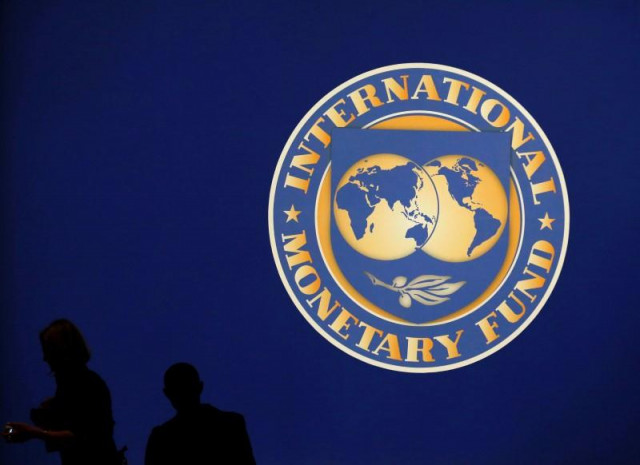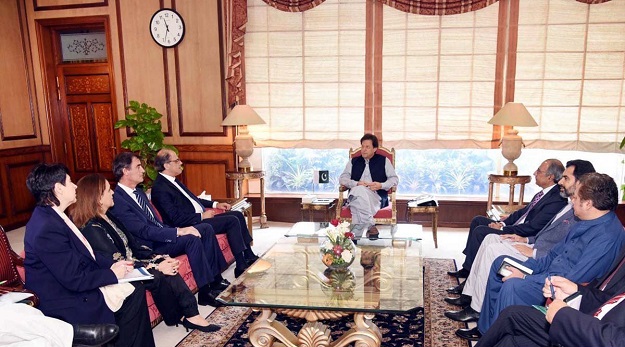IMF rules out revising programme targets
Global lender’s regional head says results encouraging so far, Pakistan needs to remain patient

PHOTO: REUTERS
In his interaction with the media during his maiden visit to Pakistan, IMF regional head Jihad Azour sounded optimistic about the implementation of the hardly three-month-old programme but at the same time he remained firm about not relaxing "very challenging targets".
"I don’t think there is a need to reset the targets and the programme is off to a good start," he said accompanied by Adviser to the Prime Minister on Finance Dr Abdul Hafeez Shaikh and other members of the government's economic team.
Azour, who is the IMF Middle East and Central Asia Department director, said Pakistan’s commitment and the level of preparedness to implement the required measures showed that it would not be a single-tranche programme.
“It is important to keep the focus on the implementation of the programme and people will gradually see that exports are growing and the economy is creating jobs,” he maintained. "We need some time for things to show their results."
The IMF regional director appreciated the government’s reforms on the social front, particularly in terms of job creation, as well as the measures being taken to address issues concerning national security.
“The programme's results, although we are only three months into it, are encouraging both on the account of how the exchange rate has been dealt with and the monetary policy has been deployed,” said Azour.
"I would try to caution ourselves. We are still at a very early stage. The first review will take place two months down the line. It is very important to see how the measures that the government is taking are being implemented and how the process of moving from the current exchange rate regime to a market-based regime is going,” he added.
“There is some nervousness but it’s normal. We need to take time before assessing the full picture.”
 IMF team meets PM. PHOTO: APP
IMF team meets PM. PHOTO: APPThe IMF official said it was a legitimate question to ask whether or not the programme would be implemented until the end. “Everyone's focus is on stabilisation but there is also a need to understand that all the results will not come at once,” he noted.
“A certain strata of the economy will need more time to respond,” said Azour. “We need to accept that only with commitment and persistence will we be able to answer the questions being raised about the programme implementation.”
Azour said the IMF mission would visit Pakistan by the end of October or the beginning of November for the first review talks. Earlier, the IMF planned to hold these talks by December.
The IMF official also acknowledged the efforts made by Pakistan in bringing stability to the economic imbalance the country was facing.
“Adequate assurances by Prime Minister Imran Khan have been provided that the programme would be adhered to and this would bring further economic stability to the country.”
On the recent attacks in Saudi Arabia on Aramco's oil facilities, Azour said countries which imported oil faced an uncertain future.
“Such countries need to reduce their reliance on oil for the production of energy,” he added.
Azour said the IMF was assessing the impact of the development on the economies of oil exporters and importers. “The volatility of oil prices could affect regional economies.”
To a question, the IMF director said that it was unreasonable to compare Egypt with Pakistan, "which are two completely different countries and economies". “Egypt is Egypt and Pakistan is Pakistan,” he remarked.
On the occasion, IMF's Mission Chief to Pakistan Ernesto Rigo spoke about the dwindling business confidence. “One of the shocks to business confidence is not knowing what is going to happen and a right framework can allow people to know what are the rules of the game,” he added.
Rigo said the revenue target would not be revised and the IMF was impressed with its growth. “The domestic GST is growing at 50% and revenue from certain sectors is also growing at the rate of 30%,” he pointed out.
The IMF mission chief advised that the FBR should strengthen tax administration and use data for broadening the base.
Speaking on the occasion, Dr Shaikh said the government was determined to meet all the programme targets related to public finances, macroeconomic stabilisation and institutional strengthening to achieve long-term growth.



















COMMENTS
Comments are moderated and generally will be posted if they are on-topic and not abusive.
For more information, please see our Comments FAQ